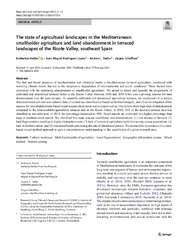The state of agricultural landscapes in the Mediterranean: smallholder agriculture and land abandonment in terraced landscapes of the Ricote Valley, southeast Spain
DOI: https://doi.org/10.1007/s10113-020-01739-x
Persistent URL: http://resolver.sub.uni-goettingen.de/purl?gldocs-11858/10979
Persistent URL: http://resolver.sub.uni-goettingen.de/purl?gldocs-11858/10979
Heider, Katharina; Rodriguez Lopez, Juan Miguel; Balbo, Andrea L.; Scheffran, Jürgen, 2021: The state of agricultural landscapes in the Mediterranean: smallholder agriculture and land abandonment in terraced landscapes of the Ricote Valley, southeast Spain. In: Regional Environmental Change, Band 21, 1, DOI: 10.1007/s10113-020-01739-x.
 |
Dokument öffnen: |
The fast and broad adoption of mechanization and chemical inputs in Mediterranean terraced agriculture, combined with warming climate trends, has led to the progressive degradation of environmental and social conditions. These factors have concurred with the increasing abandonment of smallholder agriculture. We aimed to detect and quantify the progression of cultivated and abandoned terraced fields in the Ricote Valley between 2016 and 2019 while also exploring reasons for land abandonment over the past decades. To quantify cultivated and abandoned agricultural terraces, we conducted (1) a terrace detection based on Lidar and cadaster data, (2) a land use classification based on Sentinel imagery, and (3) an investigation of the reasons for land abandonment based on participant observation and an expert survey. Our results show high rates of abandonment compared to the total available agricultural terraced area in the Ricote Valley. In 2016, 56% of the detected terraced area was classified as not cultivated. In 2019, the percentage decreased to 40%. Small parcels are cultivated to a higher percentage than large or medium-sized parcels. We identified five main reasons underlying land abandonment: (1) low income of farmers; (2) land fragmentation resulting in higher transaction costs; (3) lack of interest in agricultural activities among young generations; (4) lack of modernization; and (5) emotional bonds preventing the sale of abandoned parcels. We stressed the importance of a place-based mixed method approach to gain a comprehensive understanding of the specificities of a given research area.


